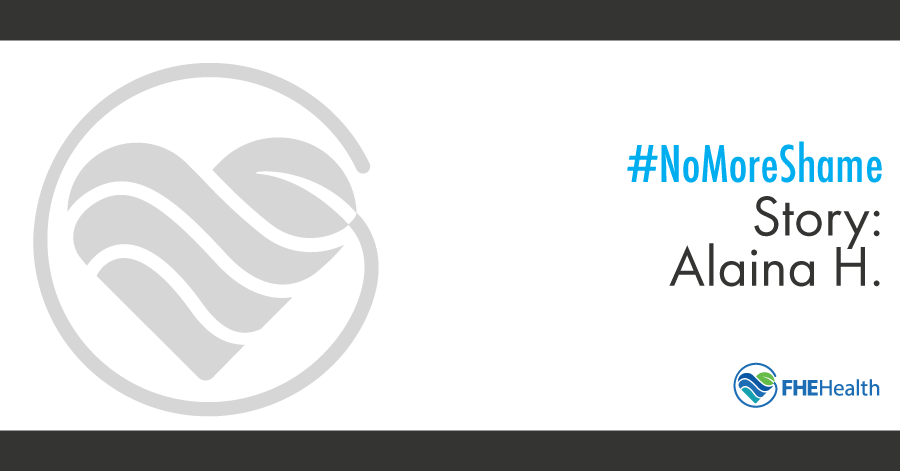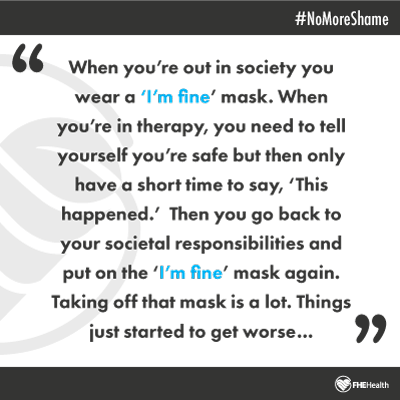
Trigger Warning: The following article mentions sexual trauma, self-harm, and suicide.
“Someday I’m going to sell my life story to Lifetime Movies and become a millionaire,” Alaina H. joked in a recent interview. Having a sense of humor has helped her navigate her mental health journey and served as a coping tool through the “chaos” that she said preceded treatment and recovery.
Alaina’s struggles with mental health began early in life:
I remember my first thoughts of suicide beginning at age 5. Thankfully, I was never able to act on them. At the age of 7, my relationship with self-harm began after falling on the playground one day. I became the child who fell a lot. Those falls were not accidental. At the age of 8, I began my relationship with disordered eating.
Alaina was 11 when she went to the psychiatrist for the first time. The wife and mother of three recounted an adolescence spent in and out of group homes and treatment centers and marked by some 30 stays in the psych ward, including multiple diagnoses that “didn’t actually get to the root of all that was going on.”
The Root Issues
One root issue was undiagnosed ADHD. It was discovered by accident in Alaina’s late 20s, after a doctor prescribed a medication commonly used to treat ADHD:
I remember it didn’t do anything to treat the original issue, but suddenly I could focus, break my tasks down into manageable steps, and even identify my emotions better. Life was pretty good.
Then came the move from her hometown on one end of Nebraska to a city on the other end. It was a big transition, one that prompted Alaina to seek therapy. The experience was eye-opening: When her therapist asked Alaina to make a timeline of her life, she “declined and started at the age of 17.”
“Something in me just wasn’t ready to face my trauma,” Alaina added. Yet trauma, like ADHD, was a root issue:
It wasn’t until I went back to my hometown over Christmas of 2018 that I realized I had a lot of buried trauma. It seemed as if everywhere I drove, I went past a place where some sort of trauma had happened. I knew I had experienced sexual abuse at the age of 3. It’s my first memory. My family did everything they could to help me navigate that. But a lot more happened to me that they didn’t know about and that nobody knew about.
What Alaina was referring to here were the other sexual and physical traumas that she experienced growing up.
It wasn’t until Alaina returned to the city that she was able to start unpacking this traumatic baggage from the past.
 “There’s a scene in the movie Frozen where Kristoff brings Anna to meet his family of rock trolls. They all roll up and shout ‘Kristoff’s home!’ That’s how it felt for me when my trauma started surfacing, only in my case a family of ‘trauma trolls’ had shown up. I knew I needed to face them in therapy,” Alaina said.
“There’s a scene in the movie Frozen where Kristoff brings Anna to meet his family of rock trolls. They all roll up and shout ‘Kristoff’s home!’ That’s how it felt for me when my trauma started surfacing, only in my case a family of ‘trauma trolls’ had shown up. I knew I needed to face them in therapy,” Alaina said.
At the time, Alaina was in a safe and happy marriage with three children and working as a stay-at-home mom.
“I was doing my hardest to do everything,” Alaina said, remembering what it was like:
When you’re out in society you wear a ‘I’m fine’ mask. When you’re in therapy, you need to tell yourself you’re safe but then only have a short time to say, ‘This happened.’ Then you go back to your societal responsibilities and put on the ‘I’m fine’ mask again. Taking off that mask is a lot. Things just started to get worse….
Attempted Suicide and the Path to Recovery
By October 2019, the depression, self-harm, and non-stop nightmares and flashbacks had become too much, and nothing seemed to dull the pain. Alaina began to plan her suicide.
Even then, though, she held onto a “thread of hope” that with treatment she could feel better, despite the barriers that stood in the way.
“There is not a single residential mental health treatment center in Nebraska or surrounding states,” Alaina said. Her chronic illnesses were another concern because many providers were not equipped to handle them.
Alaina found out about FHE’s Restore Mental Health treatment program through a Facebook support group and “called that day.”
“I finally felt hope. I just had to wait until the first of the year when I would have private insurance.”
The wait proved too hard, and on January 4, 2020, Alaina tried to overdose. Her husband was the one who found her. A few days later she checked into the Restore program at FHE.
“That was the day my life changed for the better,” she said.
What Helped the Most
Alaina spent six weeks in FHE’s Restore program, where she was able to “fall apart and rebuild.” She attributes her healing to many of the holistic aspects of the treatment program at FHE, not just the psychiatric and medical components:
- A safe space
- Great staffing ratios
- Lots of journaling
- Daily group therapy
- Peer support
- Meditation
- The biobed
- Breathwork
- The step-down part of the program
These and several other tools formed a foundation of recovery for Alaina.
What It’s Like Now
It has been over two years since Alaina completed treatment. Through practicing what she learned at FHE and adding more tools to her recovery toolbox as she has continued in recovery, she says her life is “much better.”
When asked to describe what recovery is like now, Alaina said, “It’s the greatest adventure. It is full of ups, downs, and plateaus. I didn’t know that life could be this good. It’s not easy but it is good. Because of FHE, I can navigate things that used to paralyze me. Now, instead of simply existing, I am thriving.”
What would Alaina say to someone who is on the fence about treatment?
“If you have the opportunity to go, go,” she urged. “Do the work, and it will be the best choice of your life. Also, remember that recovery is a journey that’s about progress, not perfection. Some days are harder than others, but all days are doable. Most importantly, you are worth it even if you don’t feel like it right now.”
There’s no shame in getting help for a mental health disorder or a drug or alcohol problem. That’s the message of our “No More Shame” campaign, which seeks to reduce the stigma surrounding these health issues. In continuation of that theme, this story is part of a regular series featuring the true stories of people who asked for help and found hope and healing.
Are you suffering? You can start feeling better. Call our 24/7 helpline at 1-844-335-8506.






